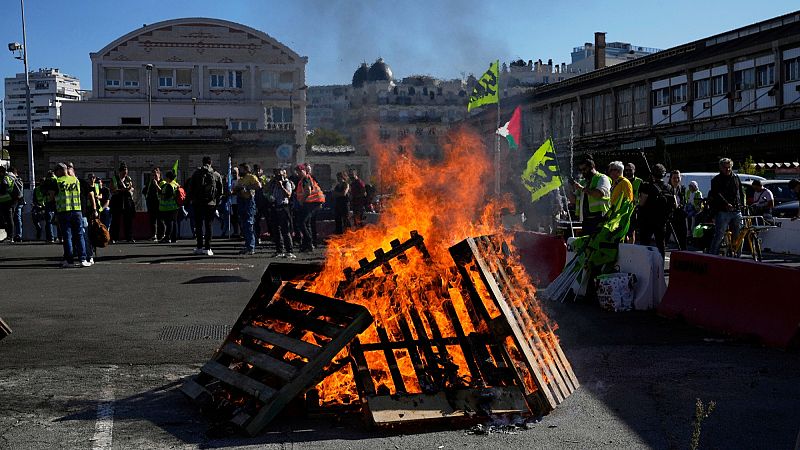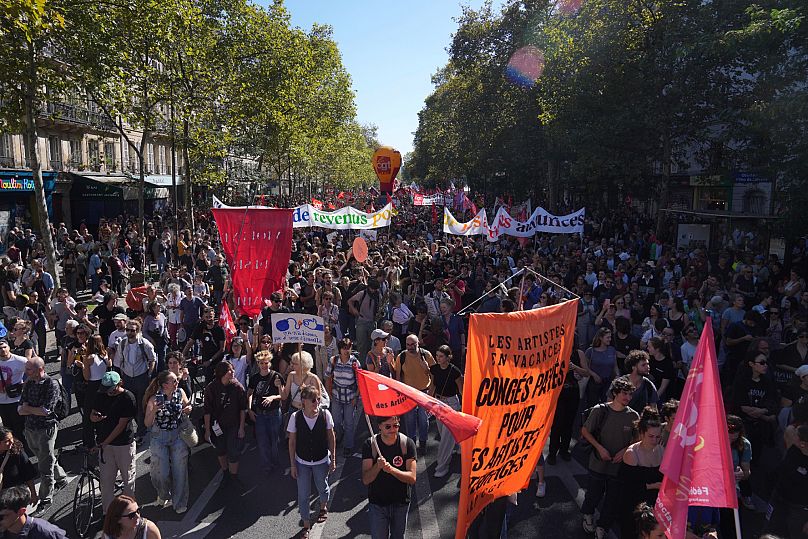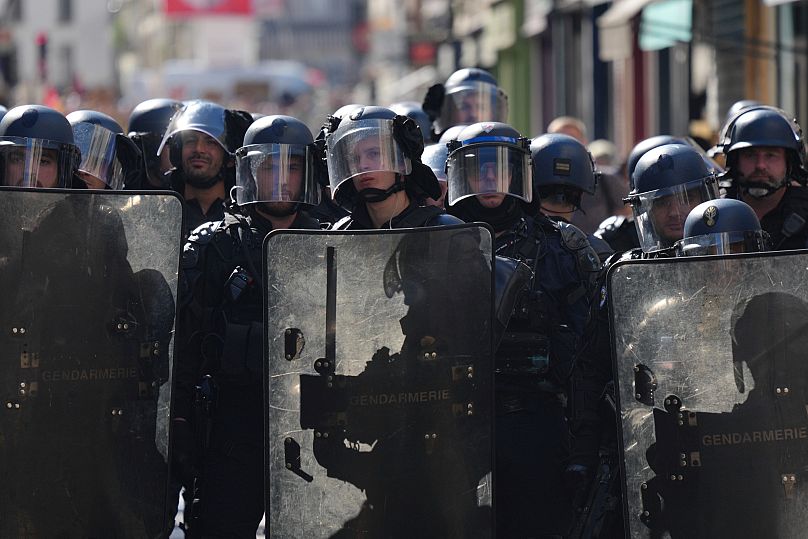French budget cut strikes turn violent as protesters and police clash in Paris

Large-scale protests in the French capital Paris turned ugly on Thursday afternoon, after a few dozen individuals clad in black attacked the police officers on site, who responded with teargas.
Small pockets of demonstrators out of a crowd of tens of thousands in Paris' 11th arrondissement around Boulevard Voltaire — a major Parisian thoroughfare — lobbed projectiles at law enforcement securing the gathering, accidentally striking other protesters and journalists, as witnessed by Euronews.
The police pushed back and charged the assailants several times, deploying teargas in an attempt to contain the unfolding situation.
The clashes further escalated by the time the line of protesters reached Place de la Nation, the landmark circle in the eastern part of Paris, where a group of demonstrators encircled the police, hurling numerous objects including rocks and bottles, and shouting "Get out" and "ACAB".
It is unclear whether anyone was injured in the skirmish at this time.
Earlier in the day, the country-wide protests were largely peaceful, as hundreds of thousands of people joined strikes and demonstrations against the government’s new austerity measures.
Eight major trade unions had called on citizens to take to the streets around the country against what they describe as “brutal” budget plans announced over the summer.
The collapse of François Bayrou’s government last week has not deterred union leaders, who maintain their call for mobilisation.
Authorities braced for one of the largest demonstrations since the pension reform protests two years ago. Intelligence services estimated between 600,000 and 900,000 people were to gather nationwide, including up to 100,000 in Paris.
Major French union CGT said more than 1 million people went to the streets across the country.
"Right now, we have a government that doesn't listen to us and is even the opposite of what the population needs," Alexandre, one of the protesters, told Euronews in the French capital.
"A government that robs fellow citizens and it's important for everyone to mobilise, for the people of France who want to be dignified and who also want to give others their dignity throughout the world," he added.
"We're in a situation of injustice. Workers can no longer feed themselves, students no longer have future prospects."
By 11 am, authorities had already counted more than 230 separate protest actions across the country, including blockades of bus warehouses and schools.
Around 10,000 people are taking part in these actions, according to outgoing Interior Minister Bruno Retailleau, who maintained that the actions were "less intense than expected".
The interior Ministry reported 94 arrests by midday, including 15 in Paris. Across the country, 32 people were taken into custody, including six in the capital. One police officer has been injured.
Travel in and around the French capital is already severely affected. Paris Metro and commuter trains run at reduced capacity, while regional services across the Paris region are heavily disrupted.
The national rail company SNCF says nine out of 10 high-speed TGV trains remain in service, but local TER lines are only operating at around 60%.
In schools, the walkout is widespread. A third of primary school teachers are on strike, according to unions. In secondary schools, nearly half of the staff are staying away from classrooms.
The Snes-FSU union, representing middle schools and high schools, reported a 45% participation, denouncing poor working conditions, low pay and the “undermining of public education.”
On the Caribbean island of Martinique, a French overseas territory, 150,000 residents were temporarily left without water after valves were deliberately closed on a main distribution site, in what authorities describe as an act of sabotage.
The supply has since been restored, but a second attempted shutdown is reported on the same site.
Thousands of law enforcement officers deployed
Security forces are deployed in exceptional numbers. Around 80,000 police and gendarmes are mobilised across France, with a heavy presence in Paris.
Police chief Laurent Nuñez warned that hundreds or even thousands of violent far-left groups are preparing to infiltrate the union protests. He urged shopkeepers along the protest route to close their businesses and protect their storefronts.
Although newly appointed Prime Minister Sébastien Lecornu quickly scrapped one of the most unpopular proposals — eliminating two public holidays — he has not ruled out the rest.
These include an overhaul of unemployment benefits, delinking pensions from inflation, and raising out-of-pocket medical costs.
At the heart of the showdown are France's fragile public finances. Last year's deficit reached 5.8% of GDP, nearly double the EU ceiling of 3%, while national debt now stands at more than €3.3 trillion, roughly 114% of economic output.
Bayrou had argued that drastic cuts are unavoidable, putting forward a plan to slash €44 billion in spending by 2026.
Today



